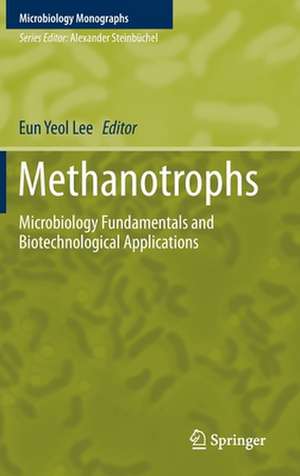Methanotrophs: Microbiology Fundamentals and Biotechnological Applications: Microbiology Monographs, cartea 32
Editat de Eun Yeol Leeen Limba Engleză Hardback – 19 sep 2019
Recently, methane has also attracted considerable attention as a potential next-generation carbon feedstock for industrial biotechnology, because of its abundance and low price. Methanotrophs can be used as biocatalysts for the production of fuels, chemicals and biomaterials including methanobactin from methane under environmentally benign production conditions. Sharing these and other cutting-edge insights, the book offers a fascinating read forall scientists and students of microbiology and biotechnology.
| Toate formatele și edițiile | Preț | Express |
|---|---|---|
| Paperback (1) | 1107.56 lei 6-8 săpt. | |
| Springer International Publishing – 19 sep 2020 | 1107.56 lei 6-8 săpt. | |
| Hardback (1) | 1113.58 lei 6-8 săpt. | |
| Springer International Publishing – 19 sep 2019 | 1113.58 lei 6-8 săpt. |
Din seria Microbiology Monographs
- 18%
 Preț: 953.82 lei
Preț: 953.82 lei - 5%
 Preț: 1594.75 lei
Preț: 1594.75 lei - 18%
 Preț: 956.33 lei
Preț: 956.33 lei - 18%
 Preț: 951.29 lei
Preț: 951.29 lei - 18%
 Preț: 952.09 lei
Preț: 952.09 lei - 18%
 Preț: 1224.36 lei
Preț: 1224.36 lei - 18%
 Preț: 939.00 lei
Preț: 939.00 lei - 18%
 Preț: 1547.49 lei
Preț: 1547.49 lei - 18%
 Preț: 946.41 lei
Preț: 946.41 lei - 18%
 Preț: 1224.68 lei
Preț: 1224.68 lei - 18%
 Preț: 947.35 lei
Preț: 947.35 lei - 15%
 Preț: 645.47 lei
Preț: 645.47 lei - 18%
 Preț: 1227.21 lei
Preț: 1227.21 lei - 18%
 Preț: 941.05 lei
Preț: 941.05 lei - 18%
 Preț: 946.55 lei
Preț: 946.55 lei - 18%
 Preț: 945.62 lei
Preț: 945.62 lei - 18%
 Preț: 1112.15 lei
Preț: 1112.15 lei - 18%
 Preț: 955.70 lei
Preț: 955.70 lei - 18%
 Preț: 944.19 lei
Preț: 944.19 lei - 18%
 Preț: 954.62 lei
Preț: 954.62 lei - 18%
 Preț: 950.66 lei
Preț: 950.66 lei - 15%
 Preț: 645.47 lei
Preț: 645.47 lei - 15%
 Preț: 643.34 lei
Preț: 643.34 lei - 18%
 Preț: 1225.94 lei
Preț: 1225.94 lei - 18%
 Preț: 947.04 lei
Preț: 947.04 lei
Preț: 1113.58 lei
Preț vechi: 1358.02 lei
-18% Nou
Puncte Express: 1670
Preț estimativ în valută:
213.08€ • 222.47$ • 176.35£
213.08€ • 222.47$ • 176.35£
Carte tipărită la comandă
Livrare economică 04-18 aprilie
Preluare comenzi: 021 569.72.76
Specificații
ISBN-13: 9783030232603
ISBN-10: 3030232603
Pagini: 220
Ilustrații: X, 278 p. 53 illus., 40 illus. in color.
Dimensiuni: 155 x 235 mm
Greutate: 0.58 kg
Ediția:1st ed. 2019
Editura: Springer International Publishing
Colecția Springer
Seria Microbiology Monographs
Locul publicării:Cham, Switzerland
ISBN-10: 3030232603
Pagini: 220
Ilustrații: X, 278 p. 53 illus., 40 illus. in color.
Dimensiuni: 155 x 235 mm
Greutate: 0.58 kg
Ediția:1st ed. 2019
Editura: Springer International Publishing
Colecția Springer
Seria Microbiology Monographs
Locul publicării:Cham, Switzerland
Cuprins
Methanotroph Ecology, Environmental Distribution and Functioning.- Enrichment and Isolation of Aerobic and Anaerobic Methanotrophs.- The Biochemistry of Methane Monooxygenases.- Multi-omics Understanding of Methanotrophs.- Diversity, Physiology, and Biotechnological Potential of Halo(alkali)philic Methane-Consuming Bacteria.- Metabolic Engineering of Methanotrophs for the Production of Chemicals and Fuels.- Methanobactin: A Novel Copper-Binding Compound Produced by Methanotrophs.- Environmental Applications of Methanotrophs.
Notă biografică
Eun Yeol Lee
Department of Chemical Engineering
Kyung Hee University
Yongin-si,
Gyeonggi-do
Korea (Republic of)
Textul de pe ultima copertă
This book offers a comprehensive overview of the microbiological fundamentals and biotechnological applications of methanotrophs: aerobic proteobacteria that can utilize methane as their sole carbon and energy source. It highlights methanotrophs’ pivotal role in the global carbon cycle, in which they remove methane generated geothermally and by methanogens. Readers will learn how methanotrophs have been employed as biocatalysts for mitigating methane gas and remediating halogenated hydrocarbons in soil and underground water.
Recently, methane has also attracted considerable attention as a potential next-generation carbon feedstock for industrial biotechnology, because of its abundance and low price. Methanotrophs can be used as biocatalysts for the production of fuels, chemicals and biomaterials including methanobactin from methane under environmentally benign production conditions. Sharing these and other cutting-edge insights, the book offers a fascinating read forall scientists and students of microbiology and biotechnology.
Recently, methane has also attracted considerable attention as a potential next-generation carbon feedstock for industrial biotechnology, because of its abundance and low price. Methanotrophs can be used as biocatalysts for the production of fuels, chemicals and biomaterials including methanobactin from methane under environmentally benign production conditions. Sharing these and other cutting-edge insights, the book offers a fascinating read forall scientists and students of microbiology and biotechnology.
Caracteristici
Discusses the microbiological fundamentals and biotechnological applications of methanotrophs Provides a comprehensive review of methanotrophs’ current applications Explores potential applications to biofuel and chemical production using methane as a next-generation carbon feedstock, as well as the mitigation of methane as a greenhouse gas
